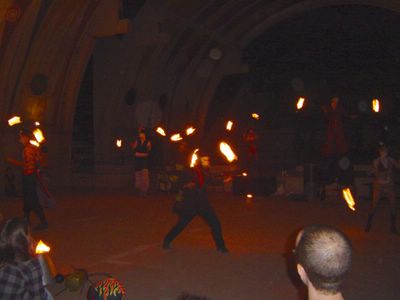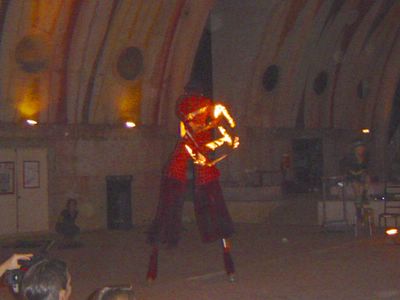A question of approach
I've identified an area that I think many people at Arcosanti are approaching from the wrong direction. One of the basic ideas of Arcosanti is that it should be possible for citizens to live and work here without commuting, walking from home to work to the store, etc. When conversations turn to the idea of expanding Arcosanti to include people who don't directly work for the Cosanti Foundation or Cosanti Originals, many people begin with the question "If we allow people to move in here, how will we prevent them from commuting to Phoenix?".
I think we need to ask "If people move to Arcosanti, how can we be sure they'll have the opportunity to avoid commuting?". If we're going to have a true city here, we can't dictate to people where they must work, any more than we could dictate what they must eat. Let's stop for a moment and look at the historical reasons people have moved to cities, then apply them to Arcosanti.
I'll start with a reason that I hear fairly often from other folks at Arcosanti: poor people move to cities because their rural jobs have been replaced by mechanized agriculture. Certainly some do, but it's not a brand-new phenomenon, and it doesn't explain the growth of cities in pre-industrial cultures. Another commonly-cited reason is for the cultural intensity of an urban setting. Again, I'm quite convinced that there is something to this theory, but I think it explains the drift of dissatisfied young adults into the cities much better than it explains families moving from farm to city.
Another prominent reason people moved into cities was military in nature. All over Europe you can find examples of "fortress-towns" where the land inside a sturdy wall was as densely settled as possible. Personally I think that the lure of the marketplace was stronger than the fear of conquering armies, but I'll grant that it's debatable.
Finally we come to my favorite theory: trade. It's much easier for buyers and sellers to find one another in a city than across a landscape dotted with small farms. Specialization of trades brought us villages, and the first "urban" dwellers. Once it became possible for a small number of farmers to support a large number of villagers, cities developed. Some cities even skipped the village stage, springing forth along trade routes and particularly at their intersections.
So, some people move to cities because advances in agriculture have left them jobless. Others come for the "bright lights" that emerge when many people live close together. Some move for safety from enemies, but the majority seem to arrive in cities for a simple reason: that's where they can make a living.
Okay, enough history. What does it mean for Arcosanti? People move to places where they can make a living. If private enterprise in Arcosanti is discouraged, then we will likely never grow beyond the number of people required to build odd concrete structures and make bells. If we give people the opportunity to make a living in a setting where they don't have to sit in a car for two hours or more every day to get to and from work, I believe they will come.
Is private enterprise incompatible with the Lean Alternative? I don't think so. No matter how far out the hippy, you've got to buy your Birkenstocks somewhere. There is a difference between the commerce necessary to keep people fed and clothed versus the hyperconsumerism that drives modern Americans to buy ever-increasing amounts of stuff. Arcosanti was never meant to be self-sufficient, consuming only what it could produce and disconnected from the outside economy. Currently, however, any suggestion of free enterprise is met with dire predictions of invasion by MacDonald's and Wal-Mart, followed by the dissolution of Arcosanti's ideals beneath a tidal wave of hyperconsumerism.
The original idea was that the structure could affect the lifestyle of the people in it. If we truly believe that, then we should have faith in it. If a family moves in where one parent sells Birks in Arcosanti and the other commutes to Phoenix, Arcosanti has not failed. In fact, such a situation could draw more people to Arcosanti, as they hear about this miraculous place where people wake up and walk to work within minutes, rather than spending hours in gridlock. If we created a hospital to serve Arcosanti and the surrounding towns, we could draw local residents in for treatment, then find them staying when they see what else Arcosanti has to offer.
To sum up, I don't think we need to worry about becoming a resort community or suburb as long as we allow people to live and work in Arcosanti without requiring them to work on Arcosanti.











